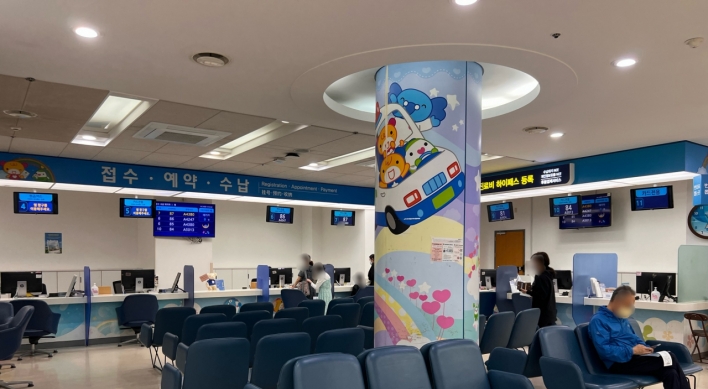South Korean financial markets barely reacted to the North Korean rocket launch on Wednesday, indicating investors’ indifference to any expected moves by Pyongyang.
The KOSPI, which opened at 1,972.33 points, up 0.39 percent from Tuesday’s market close, continued to rally despite news of the missile launch shortly before 10 a.m. It closed at 1,975.44 points Wednesday, up 0.55 percent from the previous day. The Korean won pared gains, ending at 1,075 won per dollar.
“The missile launch had been expected for some time, so there was no surprise in that,” said Oh Suk-tae, head of research at Standard Chartered Bank Korea.
“Those who move the stock market are mostly in their 30s or early 40s at the most, who rarely react to any news regarding North Korea, let alone something that came with prior notice and doesn’t immediately threaten national security.”
South Korean markets have become less sensitive to North Korea-related issues, and whatever possible sanctions left against the latest provocation wouldn’t affect the markets either, Oh said.
Defense industry stocks briefly jounced at the news of the missile launch Wednesday morning, but soon stabilized.
Some defense industry stocks such as those of HRS, S&T Heavy Industries and Samsung Techwin even ebbed slightly from the previous day.
Stocks related to power transmission to the North and the joint industrial park in Gaeseong generally climbed, defying their past tendency to fall in fear of worsened inter-Korean relations.
Moody’s said Wednesday the North’s rocket launch would not affect its sovereign credit rating on South Korea.
The launch, nevertheless, prompted Seoul’s financial authorities to hold emergency meetings on the possible impact on the economy and markets. The Bank of Korea held one at 10:30 a.m., the Financial Services Commission and the Financial Supervisory Service at 1:30 p.m., and the Finance Ministry at 2:30 p.m.
The ministry’s top officials, many of whom already moved into their new offices in Sejong City, hurried their way up to Seoul to attend the emergency meeting.
Considering that such meetings in the past usually convened in the morning, some warned that the ministries’ move to Sejong could retard the government’s response to contingencies.
Finance Minister Bahk Jae-wan said Seoul will take preemptive measures under a contingency plan should financial markets show instability related to Pyongyang’s rocket activities.
“The North Korean situation can always act as a risk factor to our economy. The government will closely monitor related movements, prevent a rise in unease across markets, and take preemptive measures based on a contingency plan,” he said.
Regarding the KOSPI’s gain and the won-dollar rate’s decline on Wednesday, Bahk said the impact on South Korean financial markets or credit ratings will be “very limited, considering the situation so far.”
The North Korean rocket flew south for thousands of kilometers, dropping its first stage off South Korea’s west coast, second stage about 300 kilometers east of the Philippines and successfully seperating the third stage as well, indicating improvement in its rocket technology.
Asian stocks climbed on Wednesday with the MSCI Asia Pacific Index headed for the longest positive streak in three years, after Japan’s machinery orders increased and as investors bet the Federal Reserve will step up monetary easing. Investors brushed off North Korea’s test launch of the long-range rocket.
By Kim So-hyun (sophie@heraldcorp.com)
The KOSPI, which opened at 1,972.33 points, up 0.39 percent from Tuesday’s market close, continued to rally despite news of the missile launch shortly before 10 a.m. It closed at 1,975.44 points Wednesday, up 0.55 percent from the previous day. The Korean won pared gains, ending at 1,075 won per dollar.
“The missile launch had been expected for some time, so there was no surprise in that,” said Oh Suk-tae, head of research at Standard Chartered Bank Korea.
“Those who move the stock market are mostly in their 30s or early 40s at the most, who rarely react to any news regarding North Korea, let alone something that came with prior notice and doesn’t immediately threaten national security.”
South Korean markets have become less sensitive to North Korea-related issues, and whatever possible sanctions left against the latest provocation wouldn’t affect the markets either, Oh said.
Defense industry stocks briefly jounced at the news of the missile launch Wednesday morning, but soon stabilized.
Some defense industry stocks such as those of HRS, S&T Heavy Industries and Samsung Techwin even ebbed slightly from the previous day.
Stocks related to power transmission to the North and the joint industrial park in Gaeseong generally climbed, defying their past tendency to fall in fear of worsened inter-Korean relations.
Moody’s said Wednesday the North’s rocket launch would not affect its sovereign credit rating on South Korea.
The launch, nevertheless, prompted Seoul’s financial authorities to hold emergency meetings on the possible impact on the economy and markets. The Bank of Korea held one at 10:30 a.m., the Financial Services Commission and the Financial Supervisory Service at 1:30 p.m., and the Finance Ministry at 2:30 p.m.
The ministry’s top officials, many of whom already moved into their new offices in Sejong City, hurried their way up to Seoul to attend the emergency meeting.
Considering that such meetings in the past usually convened in the morning, some warned that the ministries’ move to Sejong could retard the government’s response to contingencies.
Finance Minister Bahk Jae-wan said Seoul will take preemptive measures under a contingency plan should financial markets show instability related to Pyongyang’s rocket activities.
“The North Korean situation can always act as a risk factor to our economy. The government will closely monitor related movements, prevent a rise in unease across markets, and take preemptive measures based on a contingency plan,” he said.
Regarding the KOSPI’s gain and the won-dollar rate’s decline on Wednesday, Bahk said the impact on South Korean financial markets or credit ratings will be “very limited, considering the situation so far.”
The North Korean rocket flew south for thousands of kilometers, dropping its first stage off South Korea’s west coast, second stage about 300 kilometers east of the Philippines and successfully seperating the third stage as well, indicating improvement in its rocket technology.
Asian stocks climbed on Wednesday with the MSCI Asia Pacific Index headed for the longest positive streak in three years, after Japan’s machinery orders increased and as investors bet the Federal Reserve will step up monetary easing. Investors brushed off North Korea’s test launch of the long-range rocket.
By Kim So-hyun (sophie@heraldcorp.com)
-
Articles by Korea Herald




![[Grace Kao] Hybe vs. Ador: Inspiration, imitation and plagiarism](http://res.heraldm.com/phpwas/restmb_idxmake.php?idx=644&simg=/content/image/2024/04/28/20240428050220_0.jpg&u=)

![[Herald Interview] Mom’s Touch seeks to replicate success in Japan](http://res.heraldm.com/phpwas/restmb_idxmake.php?idx=644&simg=/content/image/2024/04/29/20240429050568_0.jpg&u=)


![[News Focus] Lee tells Yoon that he has governed without political dialogue](http://res.heraldm.com/phpwas/restmb_idxmake.php?idx=644&simg=/content/image/2024/04/29/20240429050696_0.jpg&u=20240429210658)









![[Today’s K-pop] Seventeen sets sales record with best-of album](http://res.heraldm.com/phpwas/restmb_idxmake.php?idx=642&simg=/content/image/2024/04/30/20240430050818_0.jpg&u=)